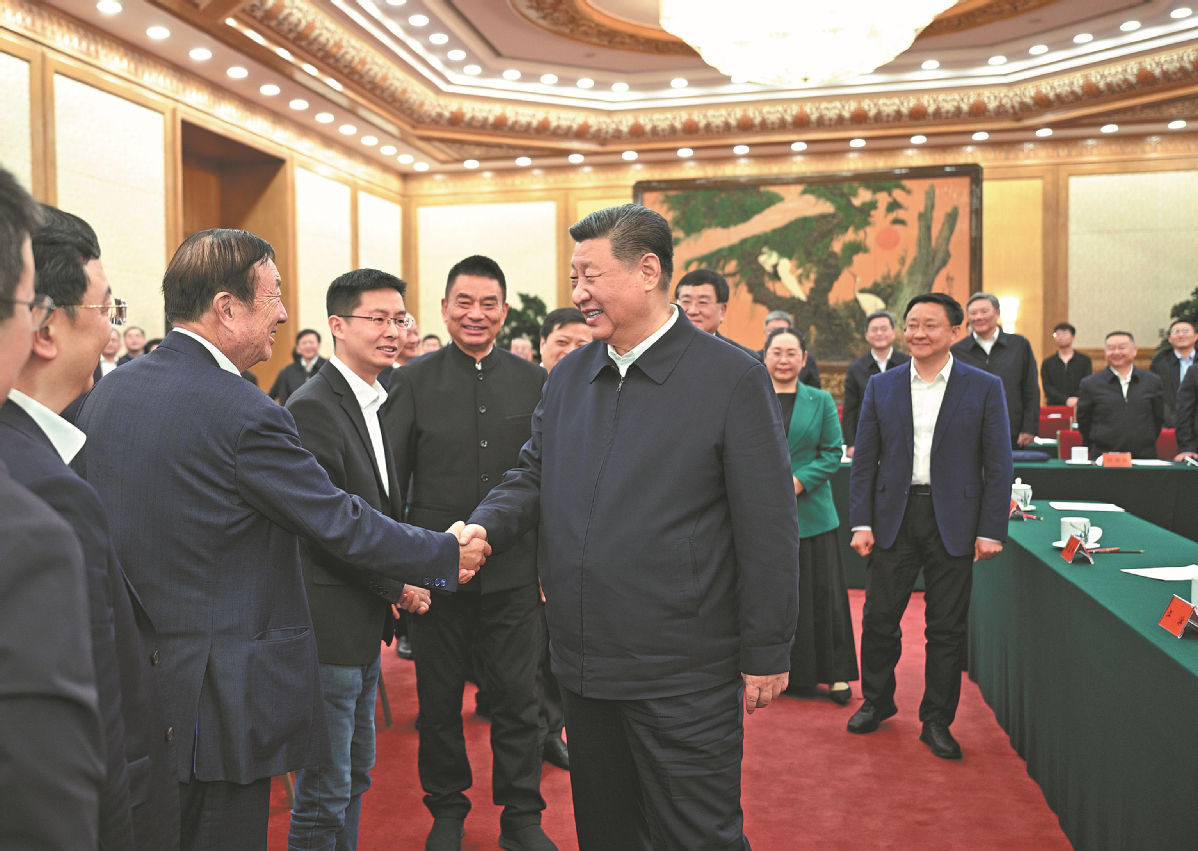
President Xi Jinping shakes hands with Ren Zhengfei, founder and CEO of tech giant Huawei Technologies, at a symposium on private enterprises on Monday in Beijing. LI XUEREN / XINHUA
China's continued support for the private sector, reiterated by President Xi Jinping, is expected to fuel further growth of tech and emerging industries, while promoting private enterprises to embrace another spring and play a bigger role in the country's economic transformation, company executives and economists said on Tuesday.
Their comments came after Xi, who is also general secretary of the Communist Party of China Central Committee and chairman of the Central Military Commission, attended a symposium on private enterprises in Beijing and delivered an important speech on Monday.
In his speech, Xi emphasized the role of private enterprises in advancing China's broader goals in technological innovation, promoting rural vitalization and improving people's well-being.
Xu Guanju, chairman of Transfar Group, a leading chemicals manufacturer, said in an interview with China Daily on Tuesday that while the breakthroughs made by Chinese artificial intelligence companies made them immensely proud and boosted their confidence in facing future challenges, the encouragement from China's top leadership was even more inspiring.
"It has greatly motivated us to work together to accelerate the development of new quality productive forces in the future, and embrace the AI era," said Xu, who attended the symposium on Monday.
The gathering saw a strong presence of companies from technology and emerging sectors, with notable names including Huawei's Ren Zhengfei, BYD's Wang Chuanfu, Will Semiconductor's Yu Renrong, Unitree Robotics' Wang Xingxing and Xiaomi's Lei Jun.
Zhang Jun, chief economist at China Galaxy Securities, noted that some of the private enterprises that attended the symposium are not big in terms of business scale or revenue, but have strong growth potential.
"It reaffirmed private enterprises' past breakthroughs in new quality productive forces, while highlighting the government's determination to cultivate future industries," Zhang said.
Observers said the participation of private enterprises from both traditional and emerging sectors showed the continuous emphasis China's top leadership places on the role of the manufacturing industry in the Chinese economy.
Liu Yonghao, founder of New Hope Group, a leading enterprise in agricultural industrialization, told China Daily on Tuesday that technology not only flourishes in high-end manufacturing and AI sectors, but also drives innovative growth in traditional sectors such as agriculture.
"Inspired by the top leadership's remarks, our company will capitalize on favorable policies and make efforts to propel further growth amid complex challenges," said Liu, who also attended the symposium.
Recalling that the previous such symposium on private enterprises, which was presided over by President Xi in 2018, was followed by a three-year bull run in China's A-share market, Zhang, from China Galaxy Securities, said that Monday's meeting will "help enhance the confidence of market entities, dispel concerns about uncertainty and play a decisive role in stabilizing the market".
Xu Hongcai, a renowned economist and deputy head of the financial and economic affairs committee of the National People's Congress, said that Xi's remarks "conveyed a clear signal that even with the changing and volatile economic and trade policies of some foreign countries, China remains focused on high-quality economic development as always".
At Monday's symposium, Xi said the government's basic principles and policies concerning the development of the private economy have been incorporated into the system of socialism with Chinese characteristics and will consistently be upheld and fulfilled. "They cannot and will not be changed," he said.
This was in line with Xi's remarks at the 2018 symposium, during which he said the country would unswervingly encourage, support and guide the development of the nonpublic sector and support private enterprises to develop toward a broader stage.
The stance was reaffirmed at the 2022 Central Economic Work Conference, which emphasized that promoting the private sector's growth is a "long-term strategy", rather than a short-term measure.
In 2023, during the two sessions, the annual meetings of China's top legislative and political advisory bodies, Xi emphasized that the Party encouraged private enterprises and entrepreneurs to let go of their concerns and burdens and boldly pursue their development.
Xu, the renowned economist, said: "These instances show that China's reform policies are continuous and stable. A stable policy and a good business environment will further enhance private enterprises' confidence, consistently attract more foreign investment and promote sustained economic growth."
As of the end of September last year, China had over 55 million registered private companies, accounting for 92.3 percent of all businesses. They contribute more than half of the country's tax revenue, over 60 percent of GDP and over 80 percent of urban employment.
In recent years, the role of the private sector has become increasingly pivotal in driving technological innovations. For example, the rise of AI startup DeepSeek and its advanced large language model, Huawei's breakthroughs in domestically developed chips and operating systems, and Unitree Robotics' humanoid robots, which staged a dance with festive vibes at this year's China Media Group Spring Festival Gala on Chinese New Year's Eve.
Zhou Mi, a senior researcher at the Chinese Academy of International Trade and Economic Cooperation, said the latest efforts of the top leadership will further bolster policies.
A package of policies is expected to be accelerated, which includes a law to promote the private sector, measures to advance mixed ownership reforms and efforts to encourage private enterprises to go global, he said.
Contact the writers at chengyu@chinadaily.com.cn